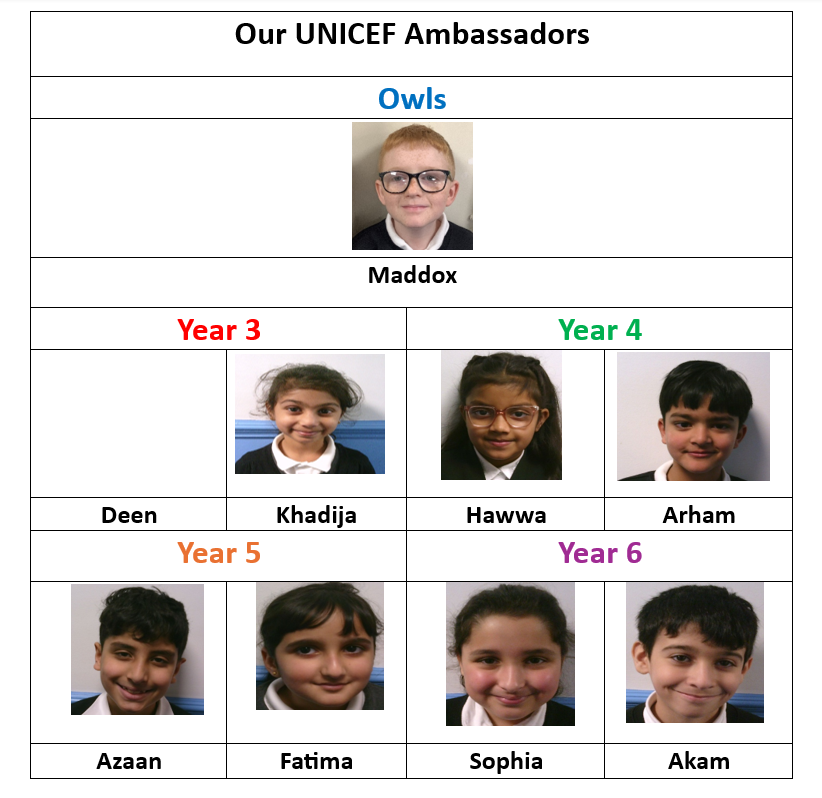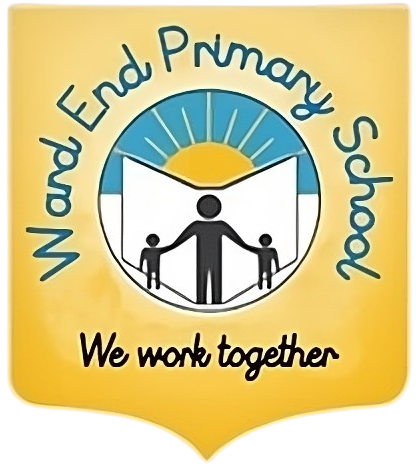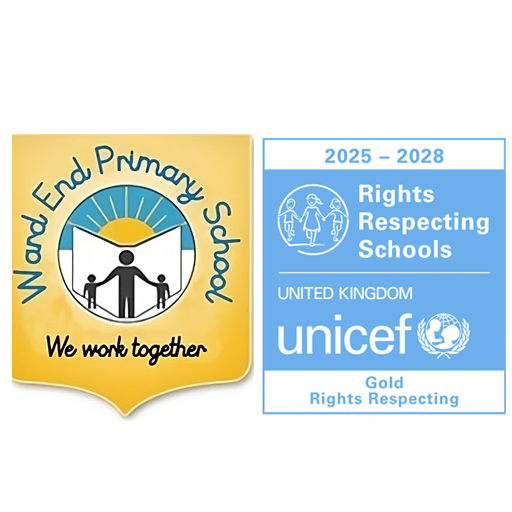Unicef Rights Respecting Gold School
Curriculum / Unicef Rights Respecting Gold School
Ward End Primary School is a Rights Respecting School and we are currently maintaining the highest level of the award which is GOLD.
What is the Rights Respecting Schools Award?
The UNICEF UK Rights Respecting Schools Award (RRSA) supports schools across the UK to embed children’s human rights in their ethos and culture. The award is based on principles of equality, dignity, respect, non-discrimination and participation. The initiative started in 2006 and schools involved in the Award have reported a positive impact on relationships and well-being, leading to better learning and behaviour, improved academic standards and less bullying. Schools involved in the Rights Respecting Schools Award work towards recognition that they have embedded United Nations Convention of the Rights of the Child (UNCRC) at the heart of a school’s practice to improve well-being and help all children and young people realise their potential. There are three levels to the Award:
Bronze: Rights Committed
Silver: Rights Aware
Gold: Rights Respecting
Gold award review NEWS
On Wednesday 22nd January 2025, the UNICEF Rights Respecting Schools Award assessor will be visiting our school to review the gold award. Evidence of UNICEF work will be viewed in addition to interviewing various staff: headteacher, UNICEF lead, teachers, teaching assistants and a governor. In addition to interviewing staff, the UNICEF ambassadors and other pupils from the school will also be interviewed for pupil voice.
Meet our UNICEF Ambassadors 2025-2026

SCHOOL CHARTERS
All charters (except class charters) have been developed by the Rights Respecting Steering Group (Rights Respecting/UNICEF ambassadors) along with leading members of staff to create joint agreements about the expectations for respecting rights in all areas of school life. They are based on the United Nations Convention on the Rights of the Child to develop a Rights Respecting School ethos.
Whole School Charter
The purpose of the Whole School Charter is about the expectations for respecting rights in all areas of school life.
Class Charters
At the beginning of each academic year, all classes create a Class Charter. Each class chooses the rights that they feel are most important to them and decide on the actions that are expected of both rights holders (children) and duty bearers (adults) in the class. The purpose of the charter is to give all members of the class a voice through which a mutually agreed upon set of standards and expectations are achieved. Pupils decide on the rights which they think are most relevant to their class and sign the agreement for how they will respect these rights.
Playtime Charter
The purpose of the Playtime Charter is about the expectations of respecting rights during playtime so that all pupils have the opportunity to play safely, enjoy their rest break and socialise with their peers.
Lunchtime Charter
The purpose of the Lunchtime Charter is about the expectations of respecting rights during lunchtime so that all pupils have the opportunity to experience a healthy and enjoyable lunchtime experience.
Library Charter
The purpose of the Library Charter is about the expectations of respecting rights during the visit to our school library so that all pupils have the opportunity to experience a pleasurable experience in which they have access to a range of reading materials for reading for pleasure in a relaxing and quiet environment.
Meet our UNICEF Ambassadors 2025-2026
HOW ARE THE UNCRC ARTICLES LINKED TO TEACHING AND LEARNING?
The UNCRC articles have been referenced in some of our school policies to show the links that they have with the school ethos and the subjects that we teach. Here are some of the UNCRC articles:
Article 2 (non-discrimination), ‘The convention applies to every child, no matter who they are, where they live, what their parents do, what their religion is, if they are a boy or a girl, what their culture is, whether they have a disability and whether they are rich or poor. No child should be treated unfairly on any basis.’
Article 29 (goals of education), ‘Your education should help you use and develop your talents and abilities. It should also help you learn to live peacefully, protect the environment and respect other people.’
Article 31 (leisure, play and culture), ‘Every child has the right to relax, play and take part in a wide range of cultural and artistic activities.’
HOW ARE THE ABOVE ARTICLES LINKED TO THE SUBJECTS?
Reading, Religious Education and PSHE (UNCRC article 2)
Our new whole class reading model, which is delivered throughout Key Stage 2, is linked to the Reading for Progress Spine texts. These have been carefully selected by the reading lead to ensure that our pupils are exposed to a range of genres, challenging texts, multi-cultural texts, but also texts that challenge discrimination/stereotyping.
During the whole class reading, Religious Education and our SCARF (PSHE scheme) sessions, the pupils discuss these matters and build an awareness on how to tackle them.
Foundation Subjects (UNCRC article 29 and 31)
Besides teaching pupils to become literate and numerate, pupils develop a wide range of skills and talents in subjects such as art & design, design & technology, physical education, Spanish (KS2 only), music, geography and history. In addition, they get to experience cultural activities through Culture Week.
Rights Respecting At Home
How can I help my child at home?
- The Article of the Week PowerPoint will be uploaded on the school website each week. Discuss the article with your child. Have a go at some of the activities on the PowerPoint with your child.
- Discuss how your child or your family can promote respect for rights, or help those whose rights have been denied or violated.
Some ways of using Rights Respecting language at home:
- You have the right to play but you must respect the family’s right to a tidy house and must tidy up your toys afterwards.
- You have the right to watch the TV but your right to be fed is equally important and you need to turn the TV off at this time.
- You have the right to an opinion and I will listen to you but you need to respect my right to express an opinion as well.
- You have the right to be healthy and my responsibility is to make you healthy by giving you healthy foods.
- You have the right to a clean world to live in and so does everyone else. Therefore, you need to respect that right and put your rubbish in the bin.
UNICEF Work in our School
Article of the Week

UNICEF Lead Steering Group Meeting Minutes

UNICEF-School Playground Climbing Frame Project

UNICEF Week 1: 4th-6th September 2024

